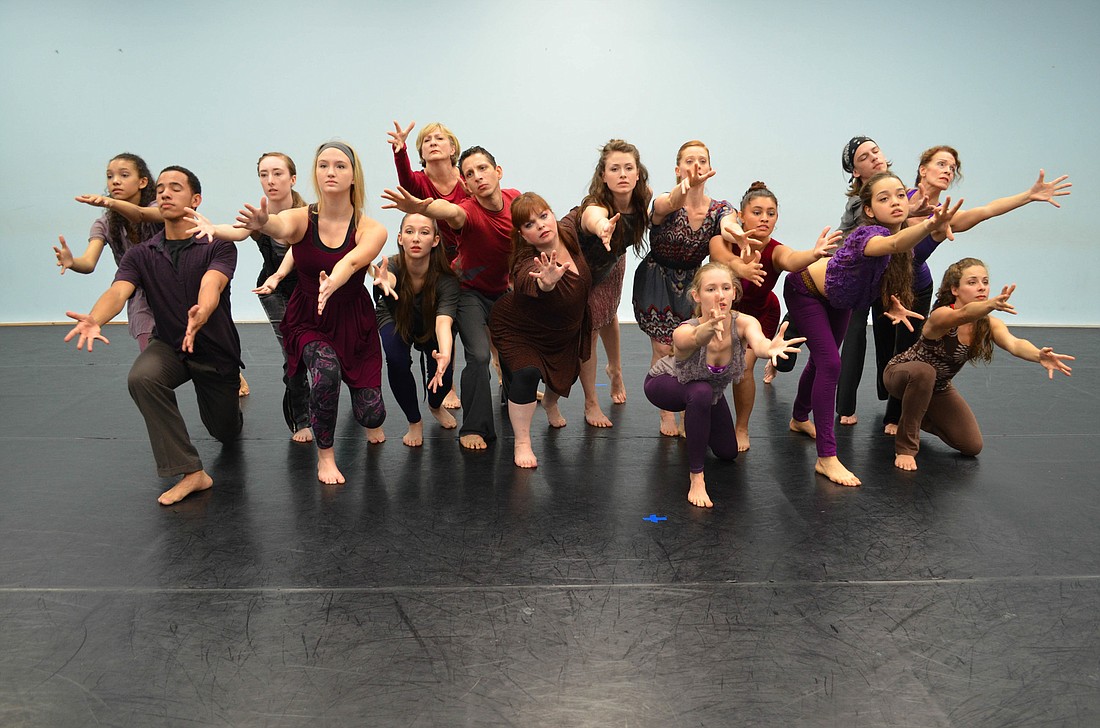- November 25, 2024
-
-
Loading

Loading

Songs in minor keys trail through the halls of First Baptist. A choir of 120 voices from six local choral groups sings a Yiddish song. The singers begin in unison. Then, each vocal part launches into a round:
“Ani-ma’amin, Ani-ma’amin / I believe with reassuring faith / He will come,” they sing.
Joseph Holt, the artistic director of Gloria Musicae, halts the singing to perfect the choir’s pronunciation. He worked with a native Yiddish speaker on the lyrics, and a few choir members also help with the partially Yiddish text.
Once the group can properly sing the words, a member of the Sarasota Jewish Chorale shares the context. The choir learns Jewish prisoners chanted “Ani-ma’amin” — which means “I believe” in Yiddish — as they were forced into Nazi gas chambers.
The next time the choir sings the Yiddish melody the song is more powerful; the words have new meaning. This is a portion of one of the 22 songs in the 80-minute cantata, “Voices of the Holocaust,” which the group will perform April 28, at the Van Wezel Performing Arts Hall.
The group consists of voices from Gloria Musicae, Sarasota Jewish Chorale, Church of the Palms choir, the Sarasota Choral Society, Sarasota Young Voices and the Booker High School choir. The instrumentation for the performance comes from The Chroma Quartet, in addition to four musicians from Sarasota Orchestra. It’s a diverse group of ages, races, religions and backgrounds.
Concentration camp prisoners either sang or composed every piece featured in the cantata just before or during the Holocaust. The cantata will make its Florida debut April 28 and will be performed as a dance, vocal, instrumental and multimedia collaboration.
Holt is the visionary behind this concert. He met the arranger of the cantata, Sheridan Seyfried, in 2004, when Seyfried, then in his early 20s, premiered the work. Since then, Holt has looked for the right group, time and place to perform this piece — and not just because it’s a unique cantata that brings together various groups.
Holt thinks it carries a powerful message that’s more than a reminder of the devastating mass genocide of 6 million Jews. To him, it’s about learning from the hatred, racial discrimination, intolerance and racial profiling that happened then and still occurs today.
Holt has a story of his own from when he was 7 years old growing up in the ’60s in Atlanta. His Presbyterian-minister father organized a group of foreign-exchange students to come together to share their cultures through food, photos and discussion. The idea was that everyone is alike. The local KKK chapter was livid with his father’s non-embracement of white supremacy, and KKK members burned a cross in the Holts’ yard as a warning.
“It struck me how people can hate each other so much,” Holt says. “I still struggle with it to this day.”
He points to the ’90s when the Hutu majority performed horrific acts on genocide on 800,000 mostly Tutsi minorities in Rwanda. He also mentions how in the next decade, the Janjaweed murdered more than 480,000 Darfuri in Western Sudan.
He finds many people don’t want to remember. “It’s a little bit of a hard sell,” Holt says of the dramatic and sometimes dark composition.
Holt explains that this music is made for every demographic to reflect on issues of discrimination.
Contemporary hatred and discrimination are not always on a large scale.
“There are some exalted and triumphant moments, but, by and large, it makes you think,” he says.
With the 65th birthday of Israel and the 50th anniversary of the signing of the Civil Rights Act this year and Holocaust Remembrance Day being April 28 — the timing of this performance is perfect.
“These elements that led to the Holocaust are still found today,” Holt says. “We need to have a better way as human beings to address these issues and rid them from society.”
Holt planned a dance and multimedia element for the performance that helps address this message. Two of the 22 songs will have multimedia slideshows that tie the events of the Holocaust to modern events to broaden the message’s scope.
The biggest addition to the performance comes from choreographer Elizabeth Weil Bergmann, who choreographed a dance to accompany the music in its entirety. Although each dance expresses a separate idea, there’s a line that runs throughout the piece that allows the audience to connect to it from start to finish.
“What she’s created enhances the music so much and elevates the work on a whole new level,” Holt says.
Sarasota-based Weil Bergmann spent many years as a choreographer, teacher and professional performer everywhere from New York City, California, and Hawaii to Michigan.
The dance group in “Voices of Holocaust,” hosted by Sarasota-Manatee Dance Alliance, includes 20 dancers. They’ve been working on her modern and moving choreography since November. The dancers consist of groups such as Fuzión Dance Artists, Moving Ethos and Sarasota Cuban Ballet School.
She says the performance is not depressing, but beautiful, and she hopes to elevate the audience’s mood.
“They aren’t just going out there and doing steps,” Weil Bergmann says. “I worked really hard for them to understand and give all of their movements meaning of what the piece is about.”
She thinks it’s one of those rare works that will stick with the audience members.
“You’re going to go on a journey with these people and songs, and you’ll come out of it in a different and better place,” she says. “I think it will fill you up as a human being.”
if you go
“Voices of the Holocaust”
When: 7:30 p.m. Monday, April 28
Where: Van Wezel Performing Arts Hall, 777 N. Tamiami Trail
Cost: Tickets $25 to $70
Info: Call 953-3368 or visit vanwezel.org
*Free composer talk at 4 p.m. April 25, at the Sarasota Herald-Tribune building, 1741 Main St. Call 953-7755 or visit gloriamusicae.org for more information.